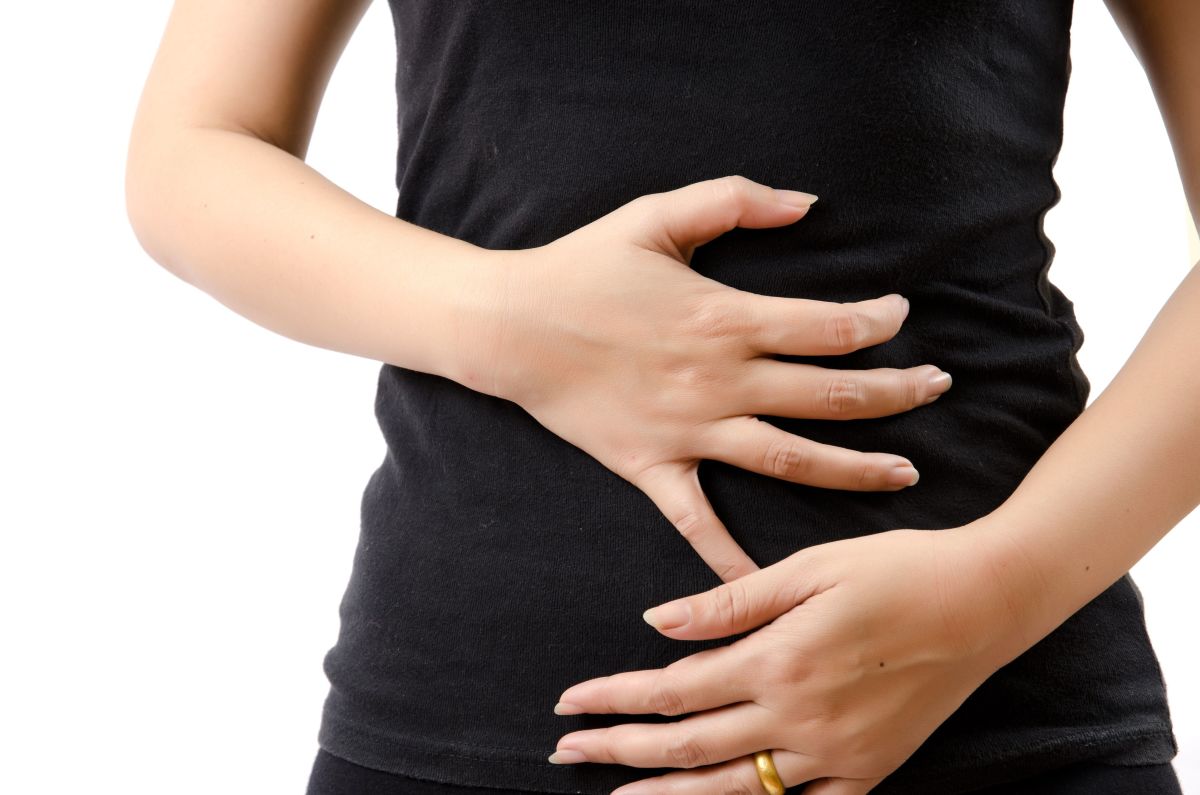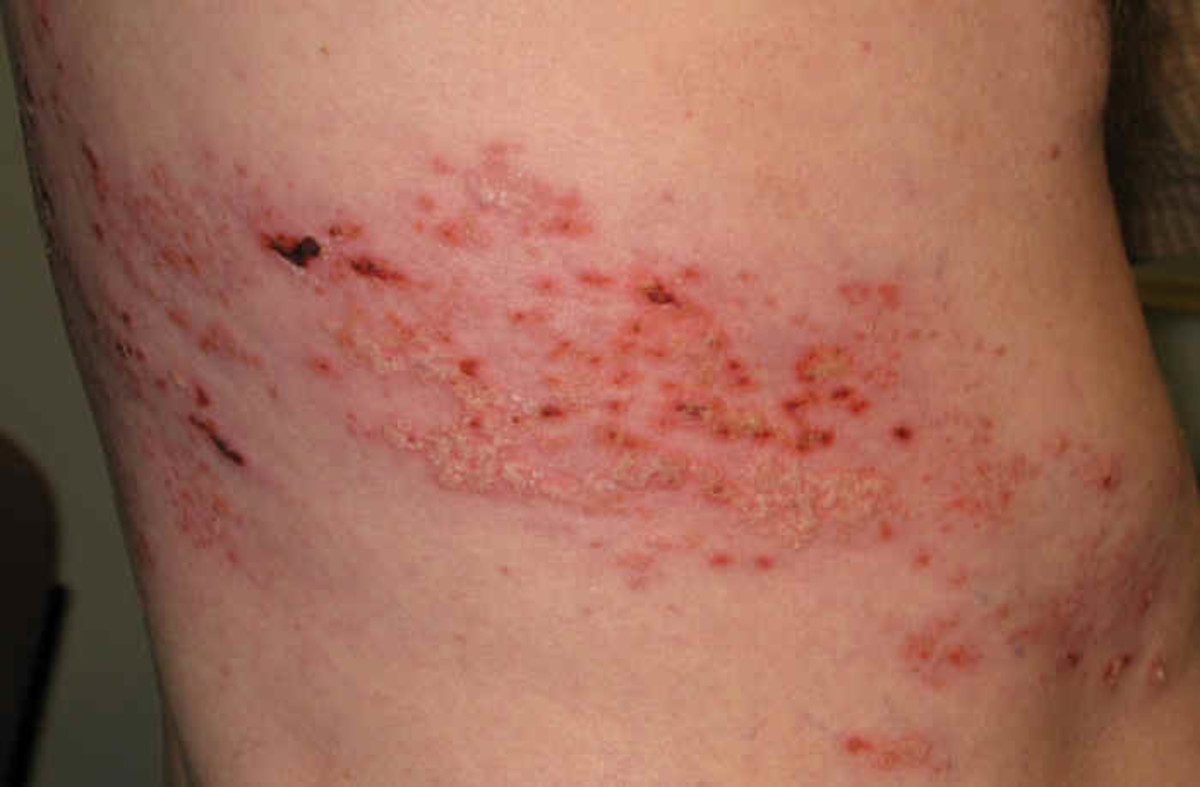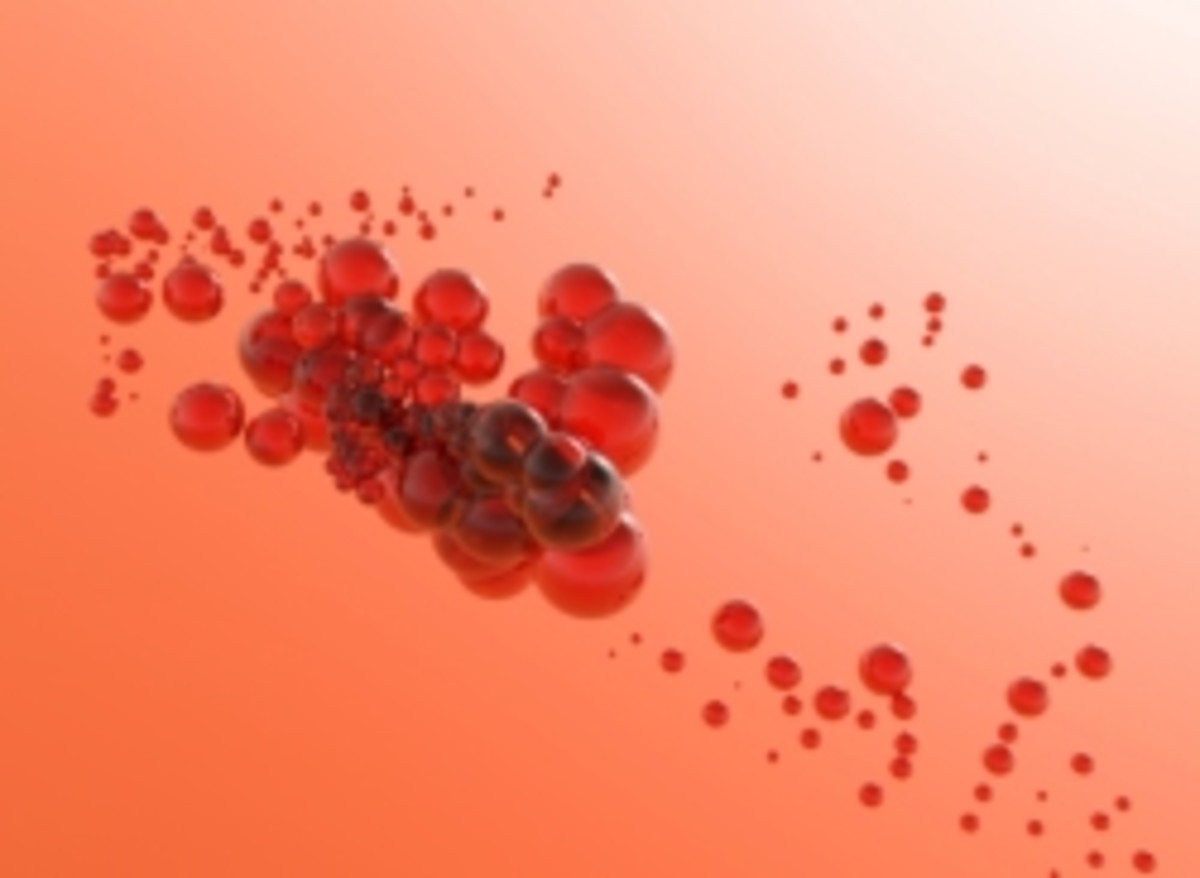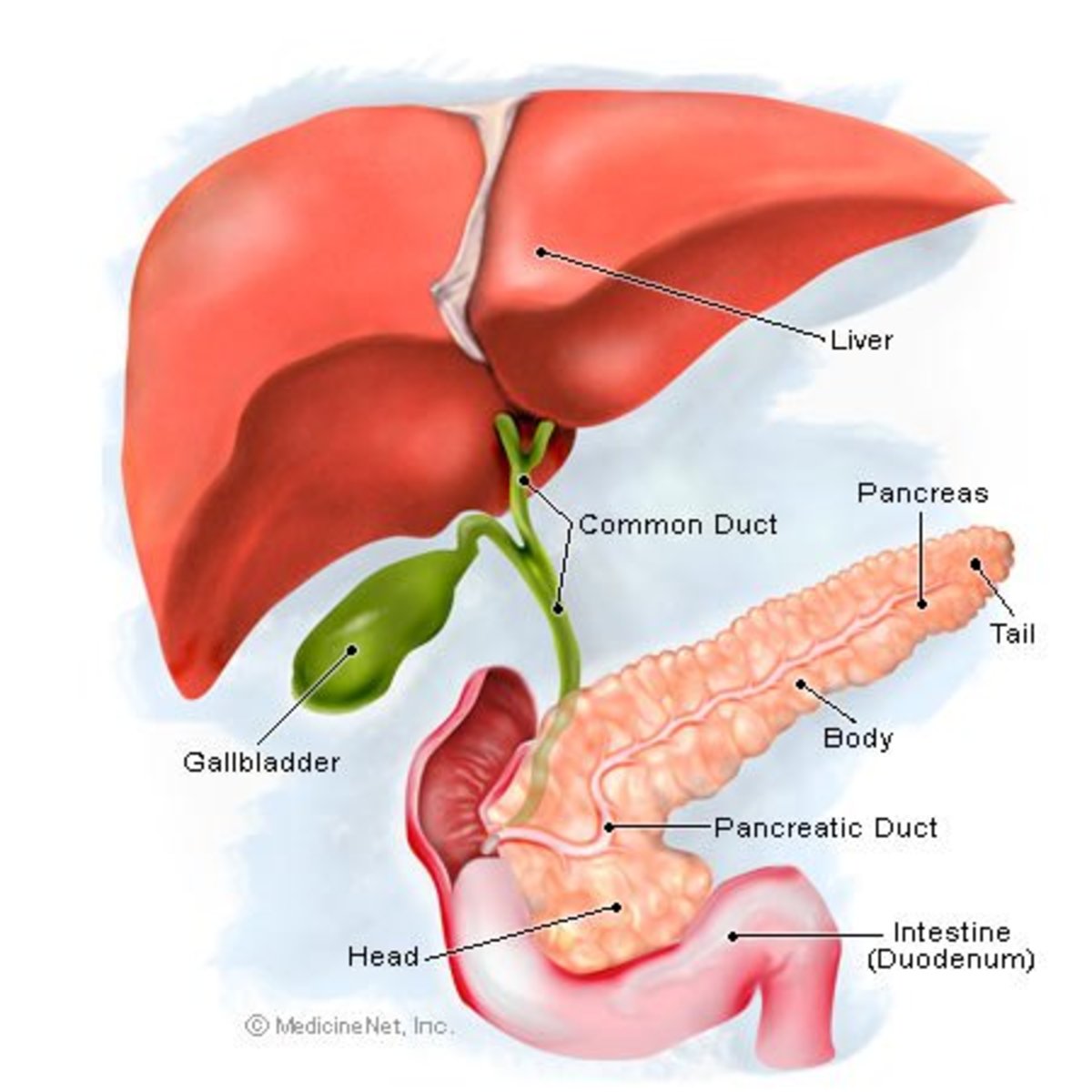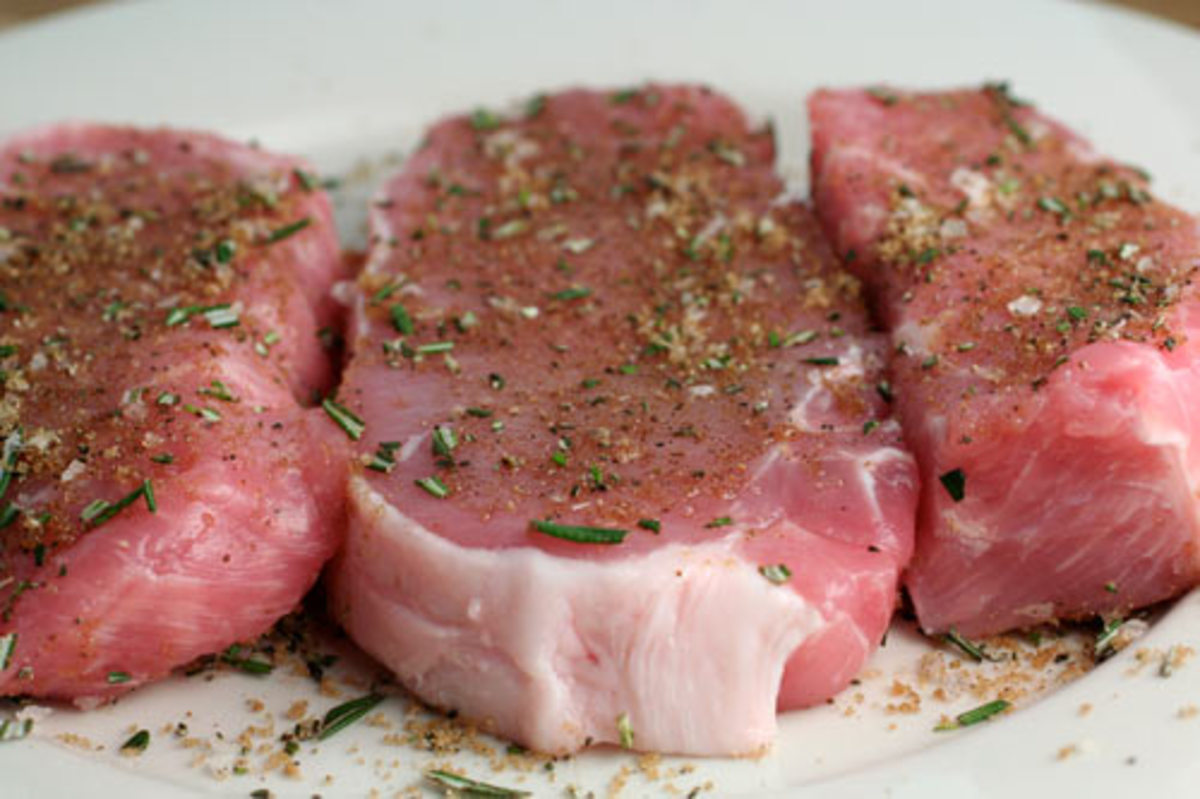Peptic Ulcers - A Natural Approach
Gatrointestinal System
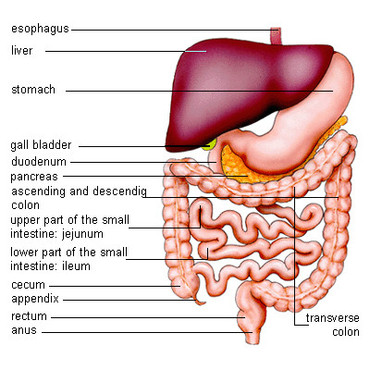
Description and Causes of Peptic Ulcers
Symptoms of Peptic Ulcers
- abdominal pain, usually in the stomach with severity relating to mealtimes, about three hours after taking a meal (duodenal ulcers are classically relieved by food, while gastric ulcers are exacerbated by it);
- bloating and abdominal fullness;
- waterbrash (rush of saliva after an episode of regurgitation to dilute the acid in esophagus - although this is more associated with gastroesophageal reflux);
- nausea and vomiting;
- loss of appetite and weight loss;
- hematemesis (vomiting of blood); this can occur due to bleeding directly from a gastric ulcer, or from damage to the oesophagus from severe/continuing vomiting.
- melena (tarry, foul-smelling faeces due to oxidised iron from haemoglobin).
Peptic ulcers are damaged areas, which look like craters, in the mucous membranes of the stomach (gastric ulcers) and/or duodenum (duodenal ulcers). Other areas further along the digestive tract can become ulcerated, but the causes are usually different and therefore so are the solutions. The immediate cause of peptic ulcers is the gastric and/or duodenal wall being attacked by gastric juice, which is highly acid (not much weaker than battery acid) and also contains potent protein-digestive enzymes such as pepsin.
These areas can often bleed, which is serious, and can also cause other problems in the long run; one is that sometimes the damage can reach sufficiently deep to cause blood vessels in the gastrointestinal wall to rupture, and another is that sometimes the ulcers can become holes all the way through the area they are in, causing peritonitis. Either of these are life-threatening emergencies, but even an ulcer that is bleeding slowly all the time can cause further problems. The most obvious consequence of gradual bleeding is anaemia, for example.
Peptic ulcers have caused controversy in the medical profession for quite some time. The reason for this is that it was never all that obvious why some people get ulcers and some people do not; for many years, the received wisdom was that ulcers are caused by excess stomach acid and stress. It is now becoming increasingly clear that at least the connection with excess acid is entirely wrong, although it is true that stress can make existing ulcers worse for reasons that will become obvious.
At this point, it is worth mentioning that another problem, unrelated to the normal causes of peptic ulcers, can cause symptoms that mimic the more normal ulcers and also look like “normal” ulcers if one is not being careful. That problem is cancer of the stomach or duodenum, which is essentially unrelated to the other causes of ulceration - although one complication of untreated gastric ulcers is actually cancer. For this reason, and also because ulcers can rapidly and without warning lead to the life-threatening emergencies mentioned above, if you have symptoms consistent with peptic ulcers you need professional advice - as soon as possible.
The causes of peptic ulcers are all related to a breakdown in the normal protective mechanisms that should, and usually do, prevent damage to the gastric and duodenal walls. In the case of the stomach, the protection is by a layer of mucus that coats the stomach wall, preventing gastric juice from getting to it; in the case of the duodenum, the protection is from the fact that pancreatic juice and bile are both quite strongly alkaline, which neutralises the highly acid stomach contents coming through. This also inactivates pepsin, which only works in highly acid conditions.
The reason why the stomach produces such highly acid secretions in the first place is twofold. Firstly, the highly acid environment changes the shape of protein molecules so that they are easier for the pepsin also present to chop them up into smaller pieces for further digestion, and also makes various minerals more available for absorption. The second reason is protective; most bacteria and other pathogens are killed or at least inactivated by the harsh conditions. Regardless of how clean your kitchen and eating utensils are, there are millions of bacteria in every bite; and of course in primitive conditions, such as those the human race has lived in for most of its history and we are adapted to, the food being eaten was no doubt much more contaminated with bacteria than is now normal.
There are several main causes of ulcers not associated with cancer. The first I will mention is quite recently discovered; infection by the bacterium Helicobacter pylori. This bug causes problems by suppressing the production of stomach acid, and also by directly attacking the stomach wall with its own digestive enzymes. Its connection with gastric ulcers was discovered by a rather heroic Australian doctor who proved the connection, which was at first disputed, by actually swallowing a concentrated culture of it. He promptly developed gastritis (usually a prelude to ulcers), which was cured by killing the bugs with antibiotics.
In fact, this was so successful that one of the standard protocols for conventional treatment of gastric ulcers is a test for H. pylori (which is a breath test followed up by a gastric biopsy if positive) followed, if the bug is found, by a cocktail of two or three antibiotics together with strong antacid medication (which solves the immediate problem while the other drugs are working).
Antibiotics for ulcers are a very recent development; the previous standard treatment was a bland diet and antacids.
Probably the commonest cause of ulcers nowadays is the use of NSAIDs such as aspirin and ibuprofen for inflammatory conditions such as arthritis. These drugs suppress the stomach wall’s natural protection against its own secretions; all these drugs have gastritis and/or ulcers as listed side effects. People taking these drugs normally need them; but it might well be a good idea to consider other methods of dealing with arthritis (for example) to avoid the need for NSAIDs. Of course, this would need to be under professional advice.
Another possible cause of peptic ulcers, and other digestive upsets as well, is consumption of very highly spiced food. Such foods cause inflammation throughout the digestive tract, which can eventually lead to ulceration if this is frequently repeated.
Finally, a diet high in chemicals and easily absorbed carbohydrates, and low in nutrition, makes it harder for the body to repair the damage that is inevitably done to the gastrointestinal lining during the process of digestion. This sort of diet is all too common, these days.
Prevention and Treatment of Peptic Ulcers
Prevention, as it usually is, is a great deal easier to accomplish than treating peptic ulcers after they have formed. Prevention is largely accomplished by avoiding the causes of peptic ulcers and improving digestion (and therefore nutrition) generally. Treatment is more problematic, because some of the things necessary for prevention of peptic ulcers are capable, if one is not careful, of making existing ulcers worse.
Prevention of Peptic Ulcers
The first step is to avoid causative factors for peptic ulcers. This is the rather familiar idea of improving the diet generally, by removing heavily processed, chemical-loaded and low-nutrition junk food from it. Specifically, more fruit and vegetables, seeds, nuts, oily fish and whole grain foods, and less sugar, white flour, red meat, artificial flavours and colours, and preservatives. A good rule of thumb is to leave ready meals on the shelf.
A rather more difficult problem is to avoid the most common cause of ulcers, which is the use of NSAIDs. Unfortunately, these drugs are usually prescribed for chronic problems which require attention; stopping the use of these drugs would have to be under medical supervision, and alternative measures would have to be taken to help whatever problem these drugs were being used for in the first place. Fortunately, such measures are available in the case of arthritis, for example.
Another dietary change specific to the prevention of ulcers is the avoidance of large amounts of very spicy foods. Fortunately, this is quite easy; simply eat milder curry!
Lastly, generalised intolerance reactions can eventually lead to ulcers or at least contribute to them. Foods that often cause such reactions include citrus fruit, cows’ dairy products (except butter), wheat-based products including bread, and tomatoes. It might be a good idea to avoid foods like these if you have ulcers or gastritis.
Treatments for Gastritis and Ulcers
First of all, I need to reiterate that ulcers are a potentially serious medical problem that needs to be referred to a professional.
What is beginning to be a standard treatment in conventional medicine is to first establish that there are ulcers present, normally by something like endoscopy unless the problem is so serious that obvious symptoms like vomiting blood are present. Then the cause is established; assuming that this is not obvious (as it would be, for example, if the patient is taking NSAIDs) a standard test would involve taking a sample during endoscopy to test for cancer, and possibly a test for H. pylori infection also. This might also involve sampling, but very early in the proceedings a simple breath test can establish the likelihood of H. pylori being present.
If H. pylori is present, then the treatment involves strong acid-reducing drugs (to keep the problem under control temporarily) together with a cocktail of two or three antibiotics for about two weeks to kill the bugs.
Natural treatments for gastritis and ulcers are similar in concept. They involve taking various herbals to soothe the inflammation and also protect the stomach or duodenal wall from the acid, and also various natural anti-bacterials to kill H. pylori. The latter might not be necessary if you already know that H. pylori is absent.
Specific Supplements and Herbs
L-glutamine in fairly large quantities helps the gastro-intestinal surfaces to repair themselves better, and hence heal ulcers over time. The amount needed for this is about 10 grams per day, taken in at least 2 doses away from food.
Vitamin A and zinc are needed for the health of the whole body, but particularly surfaces such as those of the gastro-intestinal tract. A good quality multivitamin/mineral supplement will provide these as well as other useful nutrients.
Herbals and botanicals are taken for two purposes; protecting the stomach and duodenal wall, and killing pathogens.
Goldenseal is extremely effective (probably the most effective of natural remedies) in killing pathogenic bacteria and also has some effect on other pathogens such as protozoa and fungi.
Manuka honey is particularly effective in killing bacteria on surfaces such as the stomach wall, and also soothes the stomach and intestinal lining.
Slippery elm bark and deglycyrrhised liquorice (DGL) are very effective for stomach and oesophageal inflammation (heartburn). Of the two, DGL is probably better and is also available in chewable or suckable tablets, probably the best form for gastritis and heartburn.

